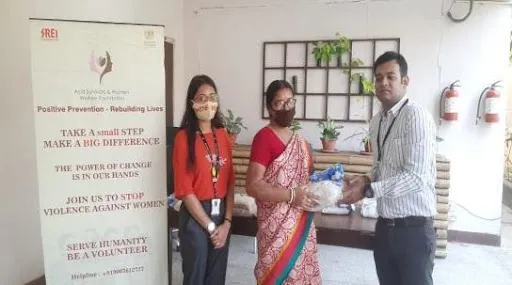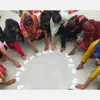How this Kolkata-based NGO is rehabilitating acid attack survivors in India
Kolkata-based Kanoria Foundation started the Acid Survivors and Women Welfare Foundation (ASWWF) to support and rehabilitate acid attack survivors with mainstream society in India.
According to the National Crime Records Bureau (NCRB), in India, roughly 1,500 acid attack victims were reported between 2014 and 2019. The country sees about 250 cases of acid attacks every year. And, almost one acid attack is perpetrated every day.
Moreover, north India accounts for 58 percent — the highest rate of acid violence in the country, while the east accounts for 18 percent, followed by the west (16 percent) and the south (8 percent).

Acid attacks often involve the act of throwing acid or a similarly corrosive substance onto the body of another to disfigure, torture, or kill a person. Most of the time, these crimes are associated with relationship, marriage, or dowry issues.
Acid violence’s impact extends beyond physical trauma; they also undergo psychological trauma that hurts their self-esteem.
Supporting these acid attack survivors and assisting them in reintegrating into society is .
The Acid Survivors and Women Welfare Foundation (ASWWF) — an NGO managed by Kanoria Foundation — has decided to build India’s dedicated psycho-social rehabilitation hub for acid attack survivors in India in its war against acid violence in the country.
Starting up
A pan-India organisation, ASWWF helps acid attack survivors reintegrate into society. It also collaborates with global institutions to fight acid attack crimes.
“When we were starting, in 2010, everyone else was into education and other normal services. At the same time, a London-based organisation reached out to us and gave an insight into the acid attacks happening in India. We didn't know the severity of the situation back then in our country,” Rahul Varma, CEO, Social Impact Initiatives, Kanoria Foundation, tells SocialStory.
As part of this, Kanoria Foundation met various acid attack survivors. It is learnt that the conviction rate for acid violence is one of the lowest — less than 5 percent —according to activists who work closely with victims. This slow rate of investigation and conviction has meant several unsolved cases adding up with the police and courts.
“We aim to wipe out acid violence from India through social, educational, and regulatory measures. Through our chapters in various cities and partners, we are reaching out to survivors all across India. We also facilitate compensation from the government and raise funds for survivors’ rehabilitation,” Rahul adds.
Under the leadership of Hemant Kanoria, ASWWF has since expanded its scope and supports survivors of all forms of violence against women, including trafficking and domestic violence.
The Kolkata-headquartered ASWWF has chapters in Mumbai, New Delhi, Meerut, Chennai, Patna, and Bhubaneswar.
What does it do?
Kanoria Foundation assists acid survivors by financially taking care of their medical treatment at specialised hospitals. It organises free surgery and medical camps in collaboration with a few other like-minded organisations.
Last year, the NGO helped 63 acid attack survivors with financial assistance to pursue their medical care, including five survivors who received treatment at speciality hospitals, Rahul says.

The programme ASWWF organised to create awareness on acid violence on the occasion of Innovative Day on November 29, 2020.
The foundation also works with educational institutions, like universities, to support their education. For instance, it is helping a few survivors pursue their higher education at Satyabhama University, Chennai. In fact, it is financially assisting with their children’s education.
Additionally, the foundation offers legal guidance in filing cases against the acid attack survivor’s perpetrator, with help from partners and jurists.
Talking about another major initiative, Rahul says, “We have been promoting skin drives because skin grafts are urgently required by victims of acid violence following an attack to minimise the injury. ASWWF drives aim to pursue donors to pledge their skin and their family members honouring their pledge after their death.”
Reportedly, skin can be donated within six hours from the time of death. Anyone can donate skin, irrespective of the sex or blood group of the donor, and the minimum age should be 18 years.
ASWWF arranges funds mostly through fundraisers and with collaborations with its partner institutions who offer to do it for free.
Ecosystem for survivors
Kanoria Foundation plans to set up a psycho-social burn-cum-rehabilitation centre to provide holistic care to acid attack survivors in Kolkata.
The 100-bed capacity residential facility will provide shelter to victims in a safe and secure environment, considering essential amenities for the psychological healing of the survivor.
Moreover, it will have a counselling centre to help survivors regain their confidence and bring them back into mainstream life, with the help of specialists and experts.
The foundation also plans to have a skill development and vocational training centre, where survivors can learn many skills, including computer training, handicrafts, tailoring, beautician course, farming techniques, dry spices making, etc.
“ASSWF will be creating a marketing chain for the survivors to sell their products. Besides, ASWWF will market their product and sell it in and outside the city,” Rahul says.
Moving forward, Kanoria Foundation plans to open more chapters and offices to further enhance the outreach of its mission to rebuild the lives of all acid attack survivors.
Edited by Suman Singh


1560685436400.png?fm=png&auto=format&h=100&w=100&crop=entropy&fit=crop)





